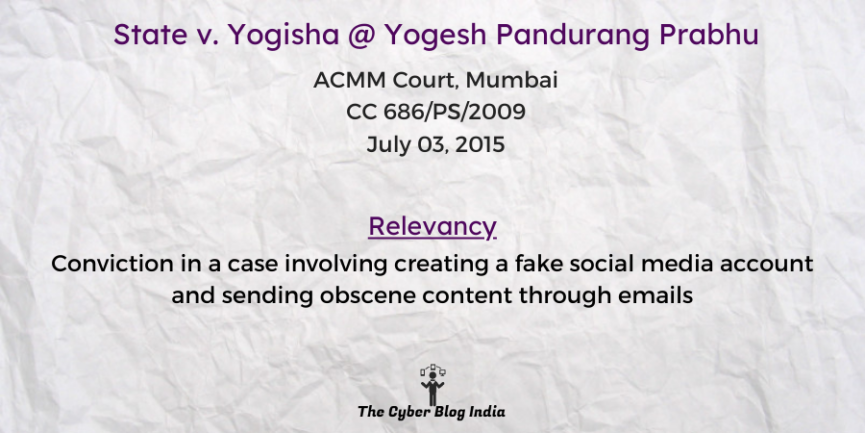State v. Yogisha @ Yogesh Pandurang Prabhu

State v. Yogisha @ Yogesh Pandurang Prabhu
In the Court of Additional Chief Metropolitan Magistrate, Mumbai
CC 686/PS/2009
Before Mr M R Natu
Delivered on July 03, 2015
Relevancy of the Case: Conviction in a case involving creating a fake social media account and sending obscene content through emails
Statutes and Provisions Involved
- The Indian Penal Code, 1860 (Section 509)
- The Information Technology Act, 2000 (Section 66E, 67, 67A)
- The Code of Criminal Procedure, 1973 (Section 248(2))
Relevant Facts of the Case
- The complainant, a Diebold Systems Private Limited employee, filed a complaint with the Mumbai Cyber Cell.
- She had an email address and an Orkut profile. Through this social media platform, she met Yogesh Pandurang and became friends.
- On meeting Yogesh, the accused, face-to-face, she did not like his demeanour and unfriended him.
- When she opened her email on March 03, 2009, she saw that an unknown ID had sent her flimsy and obscene content. She continued receiving it for several days.
- On April 09, 2009, she reported this to the police with evidence as printouts of emails. The police investigation revealed that the accused was the person sending these emails.
- The Officer-in-Charge confiscated his laptop, which confirmed that he had sent these emails.
- The police charged him under Section 509 of the Indian Penal Code, 1860, and Sections 67 & 67A of the Information Technology Act, 2000.
Prominent Arguments by the Advocates
- The prosecutor submitted that the accused also created a fake profile of the complainant named Sana Jazz. He further put her number on this fake profile. As a result, she started getting calls from taxi and rickshaw drivers putting forth their lewd demands. This has infringed her privacy. Moreover, the evidence placed on record is nothing but obscene and vulgar.
- The accused’s counsel submitted that he is the sole earning member of his family, so the court must show him leniency.
Opinion of the Bench
- The charge under Sections 67 and 67A of the Information Technology Act, 2000 is not clearly established. The evidence falls short of publishing open sexual desire, which does not prove the offence beyond a reasonable doubt.
- Even though Section 66E has not explicitly been framed in the charge, the accused’s actions have insulted the complainant’s privacy.
Final Decision
- The court convicted the accused under Section 509 of the Indian Penal Code, 1860 and Section 66E of the Information Technology Act, 2000.
Gouri Shrivastava, an undergraduate student at NMIMS School of Law, Navi Mumbai, has contributed this case summary to our repository.
